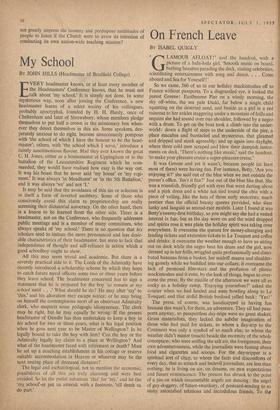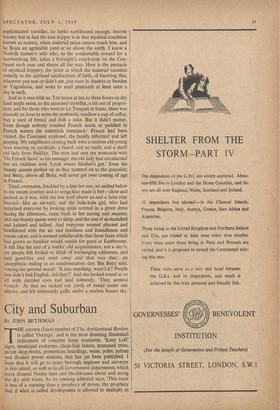On French Leave
BY ISABEL QUIGLY LAMOUR 'AFLOAT!' said the handout, with a picture of a hula-hula girl. 'Smooth music on board. bathing beauties parading the deck, visiting celebrities. scintillating entertainment with song and dance. . . . Come aboard and Sea for Yourself ! '
So we came, 560 of us in our holiday mackintoshes off to France without passports. To a disgruntled eye, it looked the purest Greene: Eastbourne Pier on a windy morning, the sky off-white, the sea pale khaki, far below a single child squatting on the deserted sand, and beside us a girl in a red raincoat to her ankles staggering under a mountain of frills and sequins she had tossed over one shoulder, followed by a negro with a drum. To get on the boat took a climb into the under- world : down a flight of steps to the underside of the pier, a 'place macabre and barnacled and mysterious, that gleamed and dripped and stank agreeably; and up again into daylight. where three cold men scraped and blew their dampish instru- ments on deck. 'There's nothing like music,' said the handout, `to make your pleasure cruise a super-pleasure cruise.'
It was Greene and yet it wasn't, because people (at least most of them) were having fun. For instance, Betty. 'Are you enjoying it?' she said out of the blue when we met outside the purser's office. 'Isn't it fun?' Just out of the blue like that. She was a roundish, friendly girl with eyes that went darting about and a pink dress and a white hat tied round the chin with a piece of veiling, like the hats of those early motorists; much prettier than the official beauty queens provided, who were lanky and languid as second-rate models. Later I found it was Betty's twenty-first birthday, so you might say she had a vested interest in fun; but as the day wore on and the wind dropped and spirits rose it was plain the holiday spirit was taking over everywhere. It overcame the queues for money-changing and landing tickets and excursion tickets to Le Touquet and coffee and drinks; it overcame the weather enough to have us sitting out on deck while the negro beat his drum and the girl, now dressed up in her frills, wriggled quite professionally and distri- buted bananas from a basket, her midriff mauve and shudder- ing gamely while we huddled into our collars; it overcame the lack of promised film-stars and the profusion of plastic mackintoshes and it even, by the look of things, began to over- come the presS. By the middle of the afternoon we were all as cocky as a holiday camp. 'Enjoying yourselves?' asked the courier when we had landed and were bowling along to Le Touquet; and that stolid British busload yelled back : 'Yes! '
The press, of course, was handicapped in having fun because this wasn't, for them, an adventure. They all had pass- ports anyway, so passportless day-trips were no great shakes. Gross materialists, they lacked the subtler imagination of those who had paid for tickets, to whom a aay-trip to the Continent was only a symbol of so much else; to whom the weather didn't matter (much) beside the enormity of the whole conception; who were sniffing the salt air, the foreignness, their own adventurousness, while the journalists were fussing about foOd and cigarettes and scoops. For the day-tripper is a spiritual sort of chap, to whom the facts and discomforts of every day, that so scratch and bedevil journalists, are less than nothing; he is living on air, on dreams, on past expectations and future reminiscence. The present has shrunk to the point of a pin/on which innumerable angels are dancing : the angel of gay-doggery, of future-swankery, of postcard-sending to so many astonished relations and incredulous friends. To the sophisticated traveller, he looks earthbound enough, heaven knows; but in fact the true tripper is in that mystical condition known as ecstasy, when material pains cannot touch him, and he floats an agreeable yard or so above the earth. I know a Norfolk farmer's wife who, as the comfortable reward for a hardworking life, takes a fortnight's coach-tour on the Con- tinent each year and sleeps all the way. Here is the pinnacle of mystical trippery, the point at which the material vanishes entirely in the spiritual satisfactions of faith, of knowing that, whatever you saw or didn't see, you were in Austria or Sweden or Yugoslavia, and woke to send postcards at least once a day in each.
And so it was with us. Ten hours at sea to three hours on dry land might seem, to the seasoned traveller, a bit out of propor- tion; and for those who went to Le Touquet in buses, there was scarcely an hour to write the postcards, swallow a cup of coffee, buy a yard of bread, and bolt a cake. But it didn't matter. Even though nobody touched French sands or paddled in French waters the essentials remained : France had been visited, the Continent explored, the family informed and left gasping. My neighbours coming back were a curious old-young man wearing an eyeshade, a beard, and no teeth, and a shrill old lady from Halifax. The man had sent ten postcards with `On French leave' as his message; the old lady had circularised her six children with 'Look where Mother's got.' Even the beauty queens perked up as they teetered on to the quayside; and Betty. above all Betty. will never get over coming of age in France.
Tired, overeaten, freckled by a late hot sun, we settled below to the return journey and to songs that made it feel—close and packed as it was, with the low roof above us and a faint roar beyond—like an air-raid; and the hula-hula girl, who had surprised everyone by looking quite normal in a green dress during the afternoon, came back in her 'sarong and sequins; and one beauty queen went to sleep, and the rest of us munched and knitted and talked. And everyone seemed pleased and bewildered with the air and tiredness and friendliness and cream cakes; and it seemed unbelievable that those faces which had grown so familiar would, vanish for good at Eastbourne. It felt like the end of a weeks' old acquaintance, not a day's; yet people felt foolish to think of exchanging addresses, and said good-bye and went away and that was that : an unemphatic ending to an unadventurous day. But Betty said, voicing the general mood : 'It was smashing, wasn't it? People just didn't feel English, did they?' And she looked round at us all with puzzled eyes and said solemnly. 'They seemed French.' At that we tucked our yards of bread under our elbows, and felt immensely gallic under a starless Sussex sky.















































 Previous page
Previous page